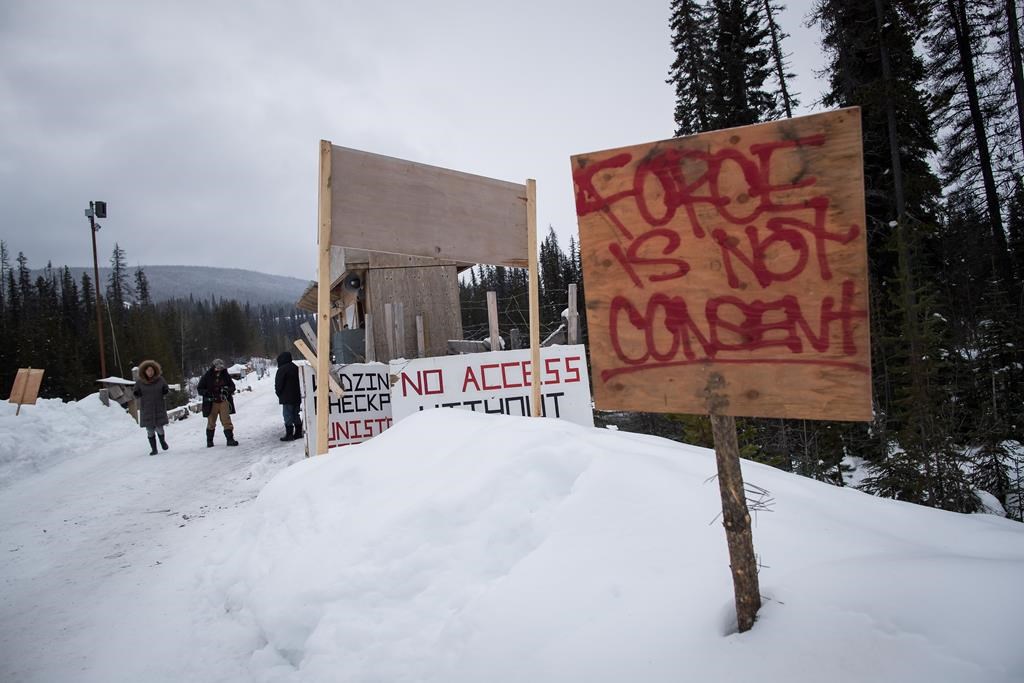A B.C. judge has extended an injunction against a northern First Nation that has been attempting to block construction of a natural gas pipeline through its ancestral lands.

In a B.C. Supreme Court decision made New Year’s Eve and published online Thursday, the judge said Coastal GasLink has suffered “irreparable harm” from the work stoppages forced by blockades and camps set up by the Wet’suwet’en people.
Madam Justice Church added that not granting the interlocutory injunction or allowing construction to continue would not only lead to further harm for the company, but also for Indigenous governments that have entered into pipeline benefit agreements with the province.
“Local governments and the provincial government will suffer loss of tax revenue and loss of business development, and economic growth and the harm to the Canadian economy from loss of procurement for the Pipeline Project and the export facility is estimated to be in excess of $20 billion,” Church wrote.
“The harm to the plaintiff and others is not only irreparable in nature but significant in magnitude.”
Church granted an interim injunction in December 2018 against the Wet’suwet’en, whose Gidimt’en clan had set up a checkpoint near Houston, B.C., meant to block construction of the 670-kilometre pipeline from Dawson Creek to a future LNG plant near Kitimat.

In January 2019, 14 people were arrested after RCMP descended on the Gidimt’en checkpoint to enforce the injunction, in an operation that the First Nation has described as a “raid.”
The Gidimt’en is one of five clans of the Wet’suwet’en First Nation, whose hereditary chiefs have never consented to the pipeline project.

Get breaking National news
The Wet’suwet’en point to Supreme Court of Canada rulings in 1997 and 2011 that affirmed those chiefs also hold rights and title over their traditional territory, which have not been signed over to the federal or provincial governments.
Coastal GasLink has argued it received consent and signed agreements with the elected band councils of the Wet’suwet’en, who are set to receive financial compensation from the $6.6-billion project.
The First Nation has cited Wet’suwet’en law in their fight against the pipeline project, which has been ongoing for years.
But Church said such Indigenous laws only become part of Canadian law through treaties, court declarations and other means — and found no evidence that the Wet’suwet’en had achieved those standards.

“While Wet’suwet’en customary laws clearly exist on their own independent footing, they are not recognized as being an effectual part of Canadian law,” the judge wrote.
Church also said the First Nation’s legal argument against the injunction order, which was mounted in June 2019, rested on the pipeline being under federal jurisdiction, which would put the federal government in violation of Indigenous law.
But the National Energy Board ultimately found in July that the project is a provincial undertaking, which, in Church’s view, “entirely disposes of the defendants’ application to vacate the Interim Injunction.”
- 35 court dates and no trial: Family of B.C. double homicide victims frustrated by delays
- ‘Embarrassing’: Vancouver councillor calls out mayor over drugs comment controversy
- ‘Like a spelling mistake’: B.C. teen’s DNA ‘corrected’ to cure rare disease
- ‘Ghosted’: Canadians stranded in Puerto Vallarta say they are abandoned by WestJet
“We have a responsibility to enforce Wet’suwet’en laws and to ensure the health of our territories for future generations, as we have done for thousands of years,” the statement read.
Church’s decision also grants an enforcement order that will “provide a mandate to the RCMP to enforce the terms of the order,” but doesn’t spell out what police can do to enforce the injunction.
The RCMP’s role in the conflict has been heavily scrutinized, with the protesters at the Gidimt’en checkpoint arguing officers used excessive force and were heavily armed when they moved into the camp last January.
A report in the U.K. newspaper The Guardian, suggesting RCMP discussed deploying snipers and putting children into social services, was seized upon by the Wet’suwet’en people as proof of their claims.

The B.C. RCMP suggested the report, which cited documents and inter-department communications only seen by the newspaper, took quotes out of context.
After Public Safety Minister Bill Blair voiced his concerns about the report, the RCMP said the force has started a review of all documents relating to its enforcement of the injunction and has not found any that reflect the statements in the newspaper article.
Wet’suwet’en hereditary chief Na’moks, who also goes by John Ridsdale, says the community is expecting further police action against his people in the wake of the latest court decision.
“We do expect the RCMP to bring it to another level. They did it last year, they’ll do it again this year,” he said in a telephone interview with the Canadian Press, while vowing to continue fighting the pipeline project.
“Our stance hasn’t changed,” he said Thursday. “Our people have said no to this, so we’ve said no.”
The RCMP said in a statement that it respects the ruling and the judicial process, but it would not say if or when police would enforce the latest injunction.
“The RCMP respects the rights of individuals to peaceful, lawful and safe protest and we are committed to facilitating a dialogue between all parties. We are impartial in this dispute and it is our hope that this can be resolved peacefully,” Corp. Madonna Saunders said.
—With files from the Canadian Press








Comments
Want to discuss? Please read our Commenting Policy first.